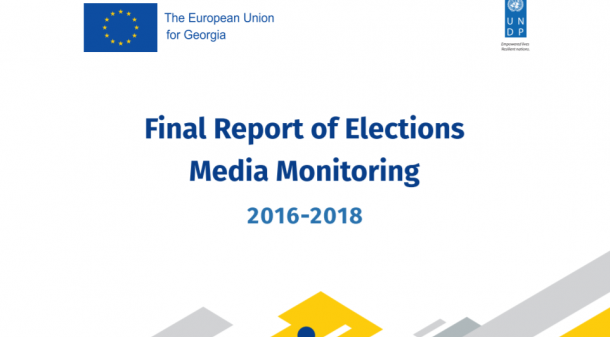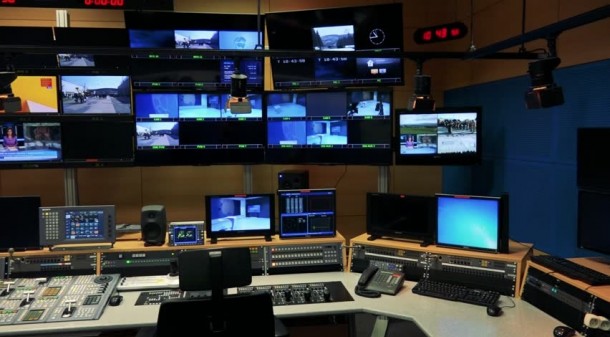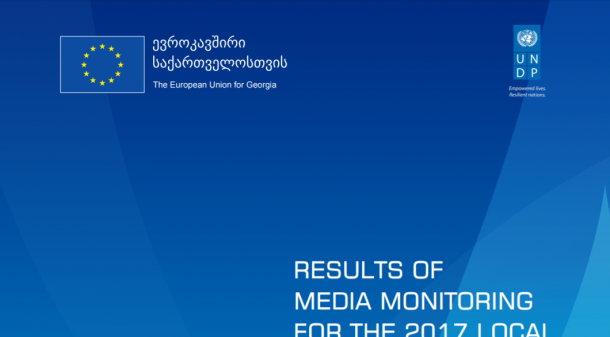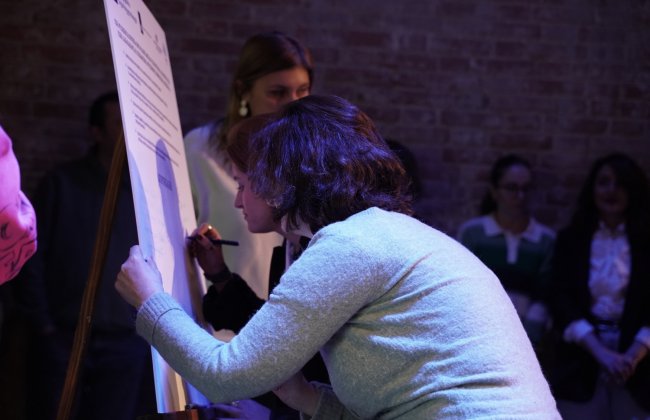14.05.2013
The results of the monitoring of the May 17 newscasts of the
following TV companies – the GPB, Rustavi 2, Imedi, Maestro/Maestro
24, Ninth Channel, Kavkasia, Adjara TV.Television channels adequately covered the events of May 17 that took place on Rustaveli Avenue. The viewers were given an opportunity to more or less see the footages of the rally and the confrontation that followed, and listen to comments and assessments made thereafter. New information and materials were broadcasted promptly after these events took place. There was an obvious attempt on the part of the television channels to reduce broadcasting, as much as possible, comments containing hate speeches. One of the anchors of the Ninth Channel even apologized to a viewer during the coverage, in a case where such a speech was still aired despite their attempts to prevent this from happening. Yet, in spite of the efforts made, abusive language expressed towards the participants of a rally, which stood against homophobia, by their opponents was still featured by all the aforementioned television channels.
The main problem which related to the coverage of the May 17 events, and became more evident throughout the daytime newscasts, concerned the inappropriate use of terms, which ultimately misled viewers. For instance: the majority of the television channels referred to the participants and organizers of the rally against homophobia/transphobia using the following terms: LGBT persons, LGBT representatives, representatives of the LGBT community and representatives of sexual minorities. In the subtitles of one of the newscasts the rally was referred to as a “LGBT” rally. The TV company Kavkasia turned out to be an exception in this respect, its newcasts were working in an extreme regime, the TV company started broadcasting from 17:00, and from the very beginning was mentioning the rally as a rally planned by “identities” or a rally held against homophobia.
The majority of the television channels corrected the given mistakes in the second half of the day and started to refer to the rally held in front of the parliament building as a rally against homophobia, while changing the aforementioned subtitles as well.
However, there still were some inaccuracies that had slipped in the evening newscast of Imedi TV. For the 20:00 newscast the anchors did not repeat the mistakes of their colleagues, however one of their journalists still referred to the rally during the live connection as a rally carried out by LGBT representatives, and that those who were chased by opponents were representatives of sexual minorities.
In the hours after the confrontation had taken place, the positions, comments, and videos of the opponents of the rally organized by “identities” were prevalent on television channels, while the position of the organizers and supporters of the rally held against homophobia was afforded scarce coverage. From the footage provided by some of the channels it was evident that such channels tried, but ultimately failed, to obtain comments from the organizers of the rally.
The TV company Maestro 24 clarified that they had contacted the representatives of “identities”, yet they were denied a reply. Alongside Maestro, other television channels were also trying to fill this void with respective comments of various human rights activists and representatives of society.
Due to improper use of terms by the media, it would have been difficult for viewers to identify the concrete purpose behind the rally which took place on May 17 in front of the parliament, which ultimately failed, while the difference between “a gay parade” and a protest against homophobia/transphobia was not defined properly. During daytime transmissions journalists were reiterating that representatives of the Orthodox congregation had confronted representatives of sexual minorities. There was an impression that only representatives of sexual minorities were participating in the rally. Some other problems included an inaccuracy of facts, imbalanced assessments, and a possibility of identifying the victims of violence. There were instances of the circulation of inaccurate and unverified information; in the 13:00 newscast of the Ninth Channel the anchor stated that the situation had become tense around the rally, and that “ teargas had been used”, while “the police had to use teargas”. Later, one of the midday anchors-Shalva Ramishvili denied the truth behind this information, while the anchor of the 14:00 newscast once again stated, without making an apology, that “ the information regarding the use of teargas hasn’t been confirmed”.
By transmitting unverified information the Ninth Channel failed to ensure compliance with the principle of “protection of due accuracy” as stipulated by the Code of Conduct for Broadcasters. In the newscasts of the GPB (Georgian Public Broadcaster)it was evident that the broadcaster had dedicated much more time to covering the viewpoints of the opponents of the rally. The stories featured to a lesser extent people with different opinions. Only several public persons and a small group of politicians stated in the given stories that every person or a group has a right of gathering and that freedom of expression was safeguarded by the constitution.
“Moambe” featured in all its newscasts the comment of a well-known actor Givi Sikharulidze, in which he referred to representatives of sexual minorities using abusive and inappropriate terms. This comment was also shown in the main issue of Moambe (20:19). We believe that the GPB has preventing responsibility to prevent the circulation of such expressions through its broadcasting.
In the recording, which features the public defender and youth and which was shown in the 16:00 newscast, several young people referred to the organizers of the rally using abusive words. The editorial staff of Moambe could have removed this specific section, as they were not made whilst live, and with particular regard to Paragraph 3 of Article 33 of the Code of Conduct for Broadcasters, which states that: “a broadcaster must avoid broadcasting content abusing any group of people on the basis of religion, ethnic, or any other grounds, including the use of certain kind of terms and videos.”
GPB’s code of conduct suggests a concrete recommendation, which is obligatory to all the journalists who make public broadcasts: Article 15.9 states that one must be cautious in choosing words and expressions. Use the words homosexual or bisexual. It is unacceptable to use words such as sodomite, pederast, gay, whilst guests should be discouraged from using such words.
It was also possible to identify the participants of the scheduled rally in the reports aired on May 17, while according to those reports, the participants had congregated in Pushkin Square. Also, in several reportages, a girl was shown to have been subjected to an assault from rally opponents while she held posters and sang against homophobia. It was shown in the footage that she was trying to cover her face, but her veil had fallen in the brawl, which made it possible to identify her on the footage. In another instance, in the special newscasts from Rustavi 2 journalists reporting about congregation of the LGBT persons and the routes they were supposed to march through, representatives of the clergy and their followers discovered the course of the rally by listening to those reports. Article 51 of the Code of Conduct for Broadcasters says that “a broadcaster must exercise utmost prudence when covering armed confrontations, accidents, states of emergency, and respect the emotions of the viewers, and keep balance between providing information of high public interest and the inviolability of person’s private life”. The editions should have exerted every effort and to treat with care the issue of the identification of those that had become the target of the assaulters on that particular day.
Based on the results of a week-long monitoring of the newscasts it can be said that the TV channels’ journalists’ reports were neutral, but at the same time the channels reported opinions that changed throughout the day. Despite the aforementioned shortcomings, the Georgian Charter of Journalistic Ethics believes that the TV companies – GPB, Rustavi 2, Imedi TV, Maestro/Maestro 24, the Ninth Channel, Kavkasia, Adjara TV – managed to provide more or less complete and comprehensive information, reflecting the position of the majority of groups related to the issue, and to society as a whole. Ultimately, society had an opportunity to receive adequate information regarding the events that had taken place on Rustaveli Avenue from Georgian television channels.
The Georgian Charter of Journalistic Ethics makes assessment concerning the effort of TV journalists and TV producers to exercise the utmost care with respect to the coverage of topics and events of such a nature. The charter believes that such levels of prudence are required not only in relation to covering events similar to those of May 17, but every time when the media is dealing with minorities-related topics. The accuracy of information and the appropriateness of terms while working on any issue related to the LGBT community’s rights must ensure for the provision of accurate information, which will be transmitted to society. This will in turn translate into a greater awareness of society in general, which also helps to promotes the enhancement of civil education and consciousness.






